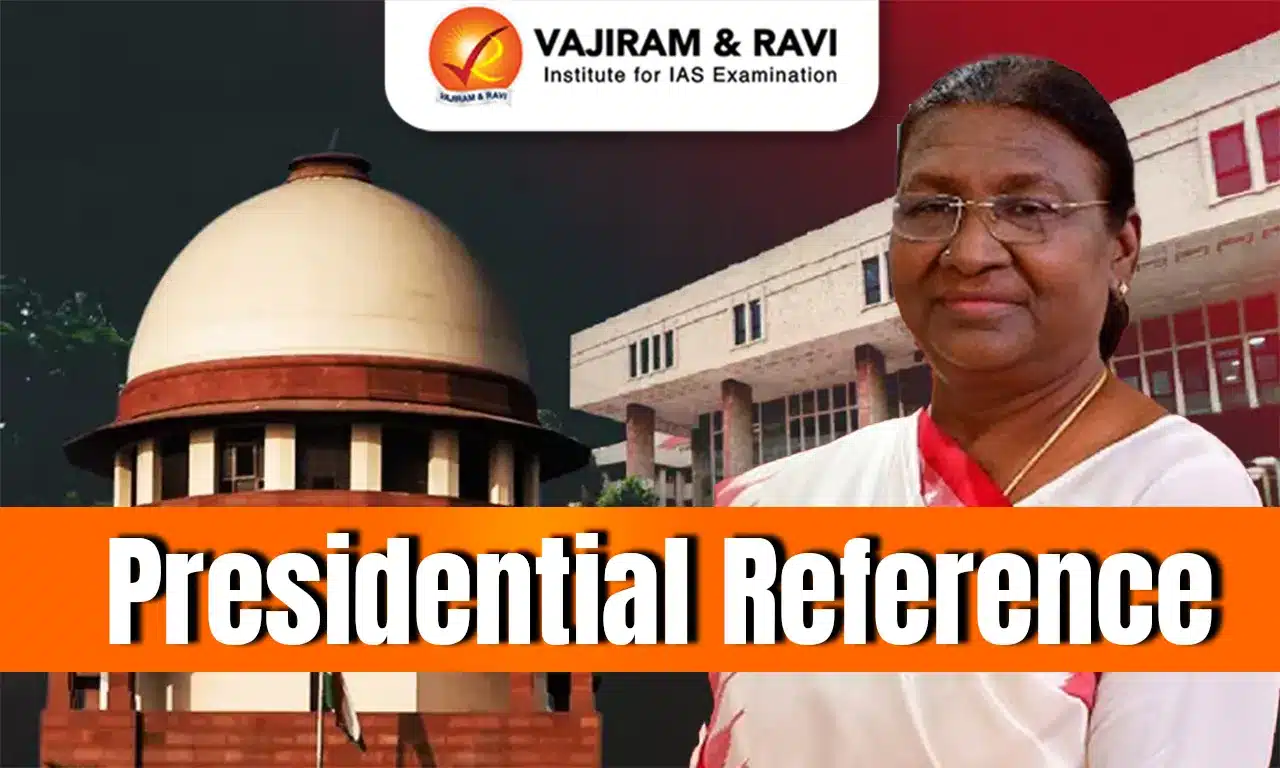Presidential Reference Latest News
President Droupadi Murmu recently referred 14 questions to the Supreme Court under Article 143.
What is a Presidential Reference?
- A Presidential Reference is a constitutional mechanism under Article 143 of the Indian Constitution, wherein the President of India seeks the advisory opinion of the Supreme Court on important questions of law or fact.
- This power enables the executive to seek judicial clarity on complex constitutional matters without initiating litigation.
- There are two components of Article 143:
- Article 143(1) allows the President to refer any question of law or fact of public importance to the Supreme Court for its advisory opinion.
- Article 143(2) pertains to disputes involving pre-Constitutional treaties and agreements, permitting the President to refer such matters for legal clarification.
- Nature of Opinion: The Supreme Court’s opinion is not binding on the President. It does not carry precedential value but holds strong persuasive authority and is usually followed by the executive and judiciary.
- Historical origin: The provision originates from the Government of India Act, 1935, which empowered the Governor-General to refer legal matters to the Federal Court.
- Procedure for Reference: The President refers to the advice of the Union Council of Ministers. As per Article 145, a minimum 5-judge Bench of the Supreme Court must hear the matter.
- The court’s discretion: The Supreme Court may choose whether or not to answer the reference. It can refuse to respond if the question is vague, hypothetical, or outside judicial purview.
- Global comparisons:
- Canada: Allows similar advisory references to the Supreme Court of Canada.
- United States: It does not permit advisory opinions, and it respects the strict separation of powers.
Presidential Reference FAQs
Q1: What is a Presidential Reference?
Ans: A Presidential Reference is a mechanism under Article 143 of the Constitution through which the President of India can seek the opinion of the Supreme Court on a question of law or fact of public importance.
Q2: How many types of Presidential Reference exist?
Ans: There are two types: one related to legal questions (Article 143(1)), and the other related to disputes arising out of pre-Constitution treaties or agreements (Article 143(2)).
Source: NIE
Last updated on July, 2025
→ UPSC Notification 2025 was released on 22nd January 2025.
→ UPSC Prelims Result 2025 is out now for the CSE held on 25 May 2025.
→ UPSC Prelims Question Paper 2025 and Unofficial Prelims Answer Key 2025 are available now.
→ UPSC Calendar 2026 is released on 15th May, 2025.
→ The UPSC Vacancy 2025 were released 1129, out of which 979 were for UPSC CSE and remaining 150 are for UPSC IFoS.
→ UPSC Mains 2025 will be conducted on 22nd August 2025.
→ UPSC Prelims 2026 will be conducted on 24th May, 2026 & UPSC Mains 2026 will be conducted on 21st August 2026.
→ The UPSC Selection Process is of 3 stages-Prelims, Mains and Interview.
→ UPSC Result 2024 is released with latest UPSC Marksheet 2024. Check Now!
→ UPSC Toppers List 2024 is released now. Shakti Dubey is UPSC AIR 1 2024 Topper.
→ Also check Best IAS Coaching in Delhi
Tags: Prelims Pointers presidential reference upsc current affairs upsc prelims current affairs















